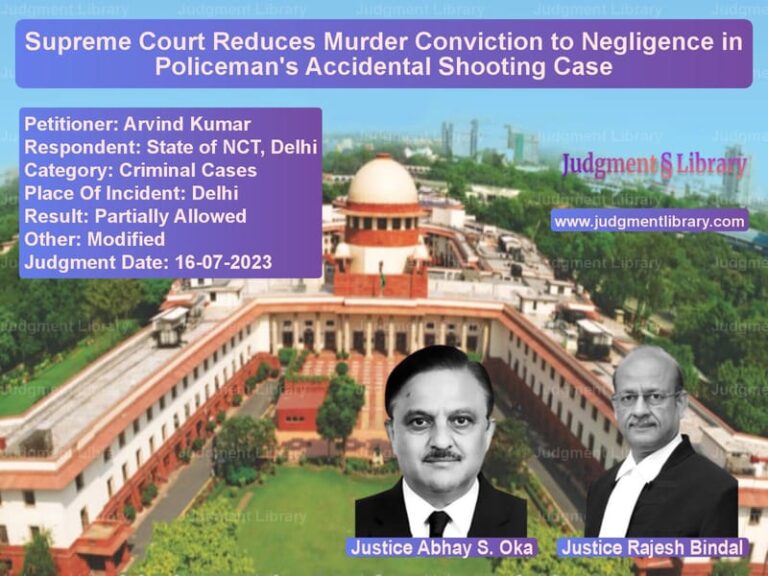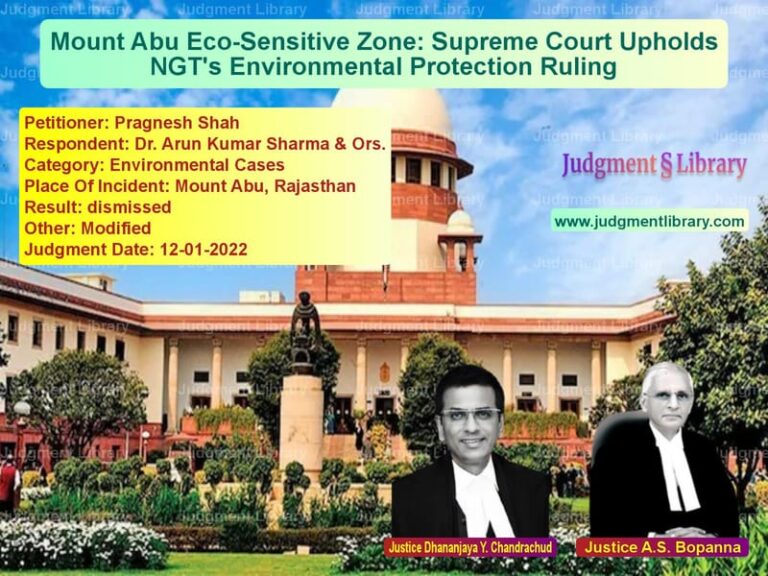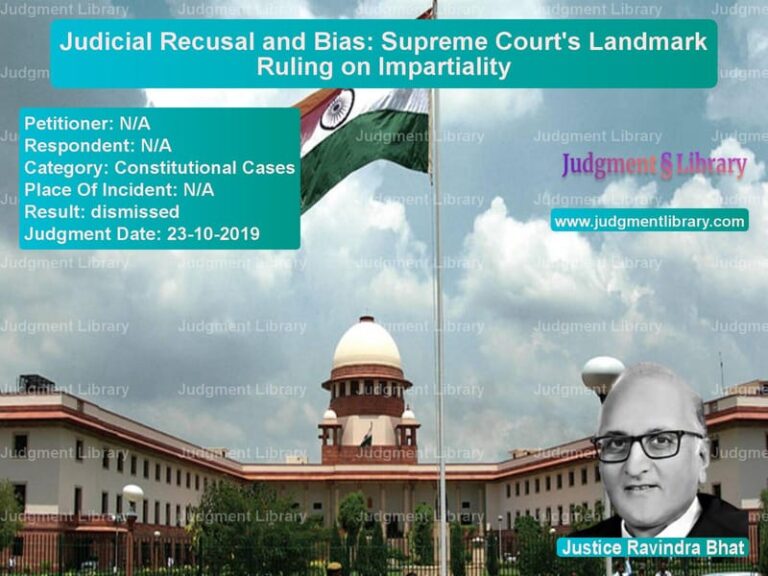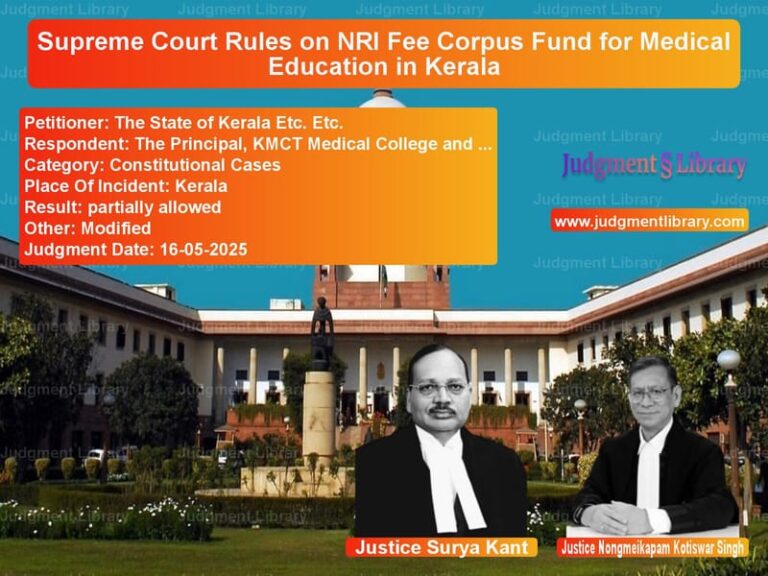Prevention of Corruption Act: Supreme Court Clarifies Evidence Rules in Bribery Cases
The Supreme Court of India recently delivered a landmark judgment in the case of Neeraj Dutta vs. State (Govt. of NCT of Delhi), clarifying the evidentiary requirements for convicting public servants under the Prevention of Corruption Act, 1988. The ruling addressed whether a conviction under Sections 7 and 13(1)(d) of the Act can be sustained based on circumstantial evidence when direct evidence of demand for illegal gratification is unavailable due to the complainant’s death or absence.
The case was referred to a Constitution Bench due to conflicting precedents on the necessity of proving demand in corruption cases. The Supreme Court resolved this conflict and set crucial guidelines on when indirect evidence can be relied upon for convicting corrupt officials.
Background of the Case
The case originated from a criminal appeal filed by Neeraj Dutta, challenging his conviction under the Prevention of Corruption Act. The key issue before the Court was whether a bribery charge could be sustained if the complainant, who was the primary witness to the alleged demand for a bribe, was unavailable or had turned hostile.
The matter was initially heard by a two-judge bench, which noted contradictory judgments on the issue and referred the matter to a larger bench for clarity. The Constitution Bench, consisting of five judges, examined the matter extensively.
Arguments by the Appellant (Neeraj Dutta)
The appellant’s counsel raised the following arguments:
- The conviction was based on circumstantial evidence, without direct proof of the demand for a bribe.
- Under existing Supreme Court precedents, proof of demand is a sine qua non (essential requirement) for conviction under Sections 7 and 13(1)(d) of the Prevention of Corruption Act.
- The absence of direct testimony from the complainant or other eyewitnesses meant that there was no foundational proof of an illegal demand.
- As per earlier rulings in B. Jayaraj vs. State of Andhra Pradesh (2014) and P. Satyanarayana Murthy vs. State of Andhra Pradesh (2015), mere possession of tainted money is insufficient to convict a public servant of bribery.
Arguments by the Respondents (State of NCT Delhi)
The prosecution, representing the State of NCT Delhi, countered:
- Demand for a bribe can be inferred from circumstantial evidence, such as the recovery of marked currency notes and the testimony of trap witnesses.
- Even if the complainant is unavailable, corroborative evidence such as recorded conversations, independent witnesses, and forensic evidence can establish guilt.
- The legal presumption under Section 20 of the Prevention of Corruption Act allows the Court to assume that a public servant accepted a bribe unless rebutted by the accused.
Supreme Court’s Judgment
The Supreme Court ruled in favor of the prosecution and clarified that:
- While direct evidence of demand is preferable, circumstantial evidence can be sufficient if it establishes beyond reasonable doubt that a bribe was solicited.
- The Court reaffirmed that mere possession of tainted money is not sufficient for conviction; there must be proof of demand.
- However, this proof of demand need not be in the form of direct oral testimony from the complainant alone. Instead, it can be established through other evidence, including circumstantial evidence.
- Evidence such as trap witnesses, audio recordings, conduct of the accused, and forensic analysis can be used to infer demand.
Key Precedents Cited
The Supreme Court relied on multiple landmark judgments while deciding the case:
- State of Andhra Pradesh vs. V. Vasudeva Rao (2004): Allowed reliance on corroborative evidence in the absence of the complainant.
- Kishan Chand Mangal vs. State of Rajasthan (1982): Established that circumstantial evidence could be used to infer demand.
- State of Madhya Pradesh vs. Ram Singh (2000): Held that corruption must be curbed and that procedural technicalities should not favor corrupt officials.
Impact of the Judgment
The Supreme Court’s ruling has several major implications:
- Strengthens anti-corruption laws: Ensures that corrupt officials cannot escape prosecution merely due to the complainant’s absence.
- Clarifies evidentiary standards: Courts can now rely on circumstantial evidence to establish bribery offenses.
- Provides safeguards against wrongful convictions: While allowing indirect evidence, the Court emphasized that mere recovery of bribe money is not sufficient.
Conclusion
The Supreme Court’s ruling in Neeraj Dutta vs. State (Govt. of NCT of Delhi) provides much-needed clarity on bribery prosecutions under the Prevention of Corruption Act. By affirming that demand for a bribe can be proven through circumstantial evidence, the Court has strengthened the ability of law enforcement to tackle corruption while ensuring that convictions are based on robust evidence.
This ruling sets an important precedent for future cases, ensuring that corrupt officials cannot escape justice simply because a complainant is unavailable to testify.
Petitioner Name: Neeraj Dutta.Respondent Name: State (Govt. of NCT of Delhi).Judgment By: Justice S. Abdul Nazeer, Justice B. R. Gavai, Justice A. S. Bopanna, Justice V. Ramasubramanian, Justice B. V. Nagarathna.Place Of Incident: New Delhi.Judgment Date: 15-12-2022.
Don’t miss out on the full details! Download the complete judgment in PDF format below and gain valuable insights instantly!
Download Judgment: neeraj-dutta-vs-state-(govt.-of-nct-supreme-court-of-india-judgment-dated-15-12-2022.pdf
Directly Download Judgment: Directly download this Judgment
See all petitions in Money Laundering Cases
See all petitions in Fraud and Forgery
See all petitions in Judgment by S. Abdul Nazeer
See all petitions in Judgment by B R Gavai
See all petitions in Judgment by A. S. Bopanna
See all petitions in Judgment by V. Ramasubramanian
See all petitions in Judgment by B.V. Nagarathna
See all petitions in dismissed
See all petitions in supreme court of India judgments December 2022
See all petitions in 2022 judgments
See all posts in Criminal Cases Category
See all allowed petitions in Criminal Cases Category
See all Dismissed petitions in Criminal Cases Category
See all partially allowed petitions in Criminal Cases Category







